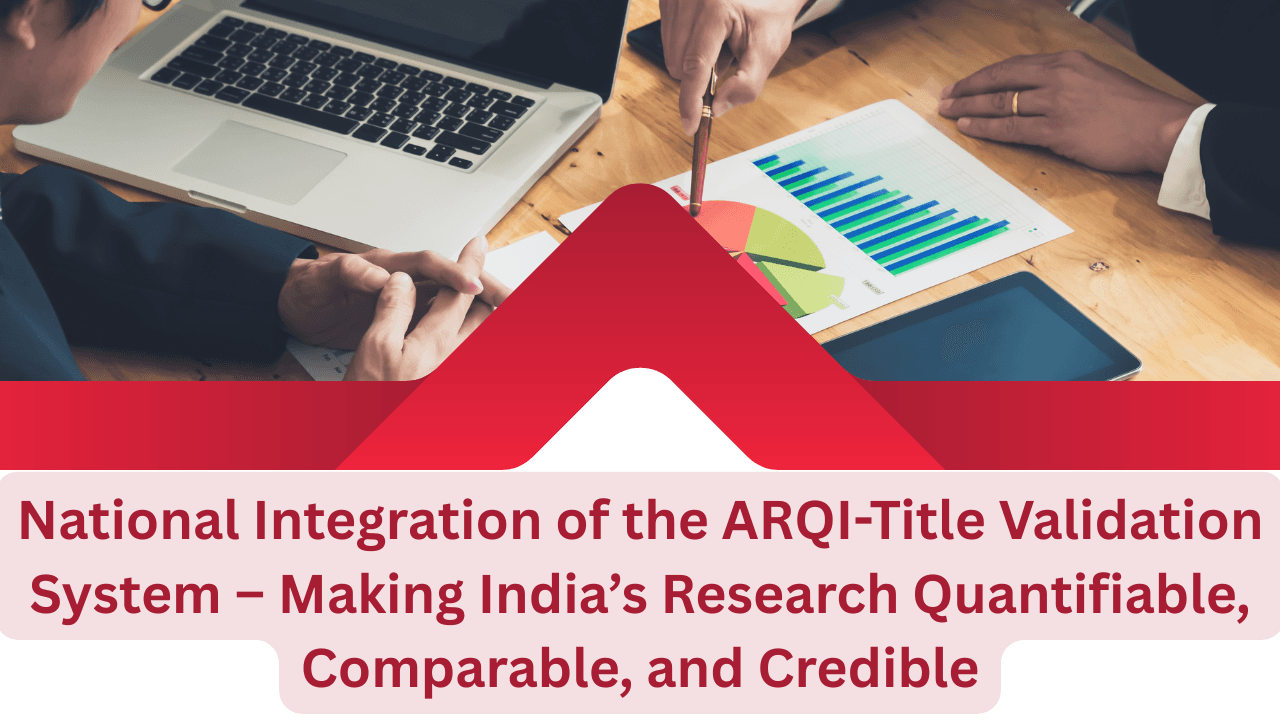A national framework to integrate ARQI-based title validation across Indian universities—bringing quantifiable governance, cross-institutional comparability, and global credibility to PhD research.
India now hosts one of the world’s largest communities of doctoral researchers, yet the nation’s research credibility remains fragmented. Each university defines its own validation standards; most treat title selection as a clerical process, not a governance function. Titles pass to RDCs without structured originality checks or measurable documentation.
The absence of a national, quantifiable quality benchmark allows duplication, inconsistent reviews, and weak global visibility to persist. What India lacks is not intellect but integration—a unified, data-driven mechanism linking every PhD title to transparent validation.
The ARQI-Title Validation System, conceived by Dr. Rajesh Kumar Modi through Anushram.com, directly addresses this gap by proposing a nationally integrated, auditable framework for research title governance.
The Vision – From Fragmented Approval to Federated Accountability
The system envisions every Indian university adopting a common ARQI-1100 framework for title evaluation. Each approved title receives a digital identity—a Title Readiness Score (TRS) out of 10—validated by a university-level Topic Panel, cross-checked at the state level, and logged into a National Research Registry.
Operated under UGC or AICTE supervision, this registry enables inter-university comparison, duplication prevention, and identification of emerging research clusters. Research governance thus shifts from fragmented approvals to federated accountability.
Structural Blueprint of the ARQI-Title Validation System
The model integrates policy uniformity, digital infrastructure, and transparent evaluation across three layers.
Institutional Layer – University Implementation
Each university forms a five-member Topic Panel (HOD, Guide, Senior Scholar Representative, External Expert, Director Research). Titles undergo three iterations—concept presentation, literature-gap mapping, and final defense—with scores recorded on the ARQI dashboard.
State Layer – Cross-Institution Review
State research councils periodically audit randomly selected titles, flag duplication, and enable cross-disciplinary review through digital participation.
National Layer – Central ARQI Registry
UGC/AICTE maintains the National ARQI Registry, integrated with Research Quest. Approved titles are stored with TRS scores, dates, and panel signatures, each generating a unique QR code for audit and verification.
The ARQI-1100 Scoring Matrix
Title validation is divided equally across four criteria: novelty and gap identification, feasibility and methodology, relevance and impact, and ethical compliance and originality—each carrying 25% weight. The cumulative outcome generates the Title Readiness Score (TRS) on a 0–10 scale.
Universities can benchmark departments using mean TRS values, encouraging constructive competition and continuous quality improvement.
Digital Integration – Research Quest as the Verification Engine
Research Quest acts as the system’s verification backbone. On title submission, it auto-generates a literature gap map highlighting covered and unexplored areas. Panels attach this evidence to the approval file, while national dashboards access metadata without exposing confidential research data.
Implementation Phases for National Rollout
Phase I – Pilot Integration: Select universities implement ARQI validation within existing RDC structures, supported by ARGI-1100 training.
Phase II – Digital Registry Launch: UGC launches the National ARQI Registry with QR-coded title certificates and accreditation access.
Phase III – Mandatory Adoption: Integration with NAAC and AICTE metrics, making ARQI compliance a national standard.
Governance and Accountability Metrics
Institutions submit annual Research Governance Scorecards tracking approval timelines, TRS benchmarks, cross-departmental review rates, duplication metrics, and plagiarism compliance—creating a real-time national picture of research quality.
Advantages of National Integration
Transparency: Every title is traceable from approval to publication.
Comparability: Uniform metrics enable cross-university benchmarking.
Credibility: Digitally verifiable titles build international trust.
Efficiency: Faster approvals reduce academic and funding delays.
Accountability: Research leaders carry measurable responsibility.
Policy Alignment with National Education Vision 2047
The ARQI-Title Validation System aligns with India’s Vision 2047, emphasizing outcome-based learning, transparency, and global competitiveness. By 2027, every ARQI-approved PhD title can be benchmarked against international publication and citation indicators.
Anushram.com’s Role in National Capacity Building
Anushram.com serves as the technical and training partner, delivering ARGI-1100 workshops, digital dashboards, evaluation rubrics, and train-the-trainer modules—decentralizing competence while standardizing quality.
Building Global Confidence in Indian Research
An ARQI-certified title signals verified rigor to journals, ranking bodies, and funding agencies. A TRS of 9/10 represents peer validation, ethical clearance, and novelty proof—positioning India as a global leader in research quality benchmarking.
Conclusion – Quantifiable Credibility for a New Era
The missing link in India’s research ecosystem has been traceability. The ARQI-Title Validation System restores it by making research quantifiable, comparable, and credible.
As Dr. Rajesh Kumar Modi notes, “We cannot improve what we cannot measure. ARQI gives India the language to measure truth in research.”
Visit Anushram.com | Learn about ARQI-1100 Series | Explore Research Quest | Connect with Dr. Rajesh Kumar Modi
Visit us for more info - www.anushram.com Call now for more details: +91 96438 02216



